AI Score in NEURONwriter: A Guide to Content Optimization for Google and LLM.
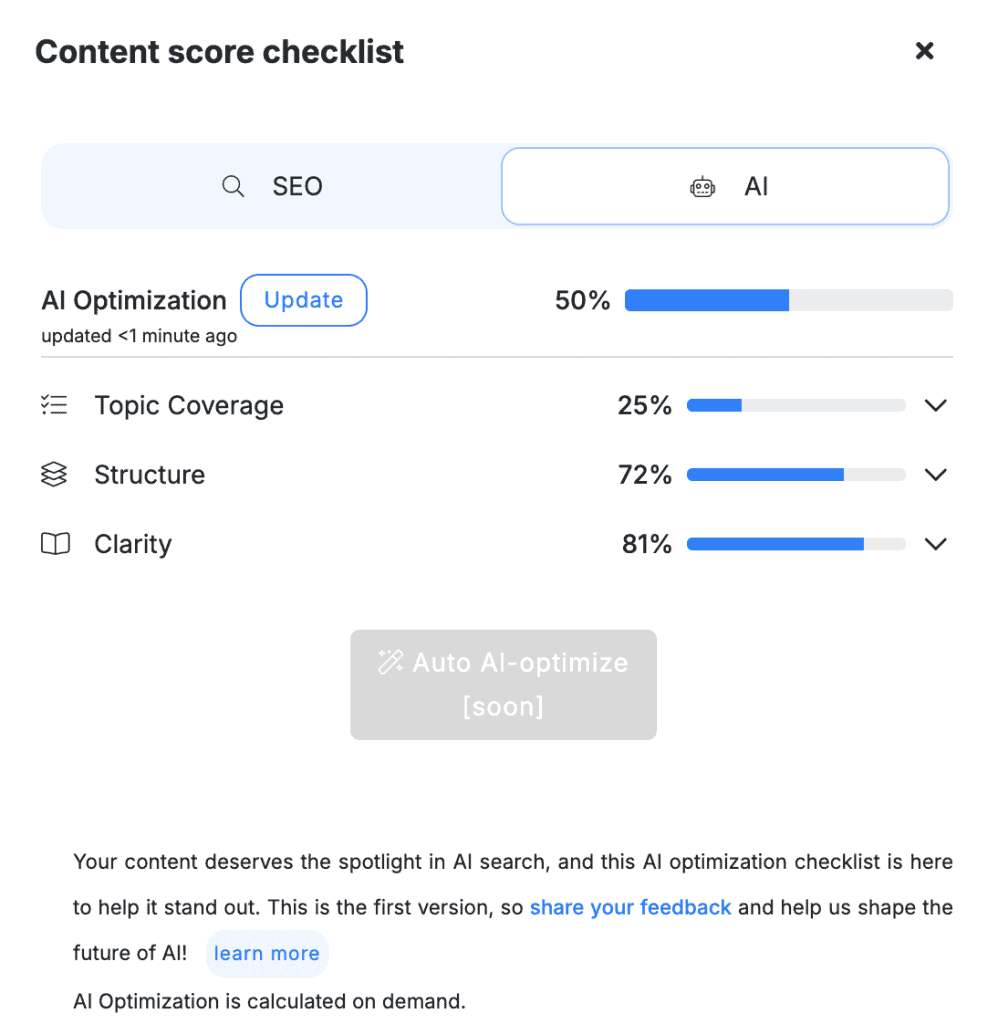
The search environment is dynamically evolving. Google is increasingly boldly integrating AI (as in Search Generative Experience), and users are increasingly using LLM-based chatbots (like ChatGPT) to find answers. This means that your content must be not only optimized for keywords, but also understandable, well-structured, and thematically comprehensive for artificial intelligence. Traditional SEO metrics, while still important, do not give a complete picture of content readiness for this new era.
Here come the questions:
- Is my content clear enough for AI to correctly interpret and use it in responses?
- Do I cover the topic comprehensively enough for algorithms to consider my article an authoritative source?
- Is the structure of my text logical not only for humans, but also for machines?
Lack of answers to these questions is a risk that your content, even well-optimized for traditional SEO, will be overlooked by new search channels.
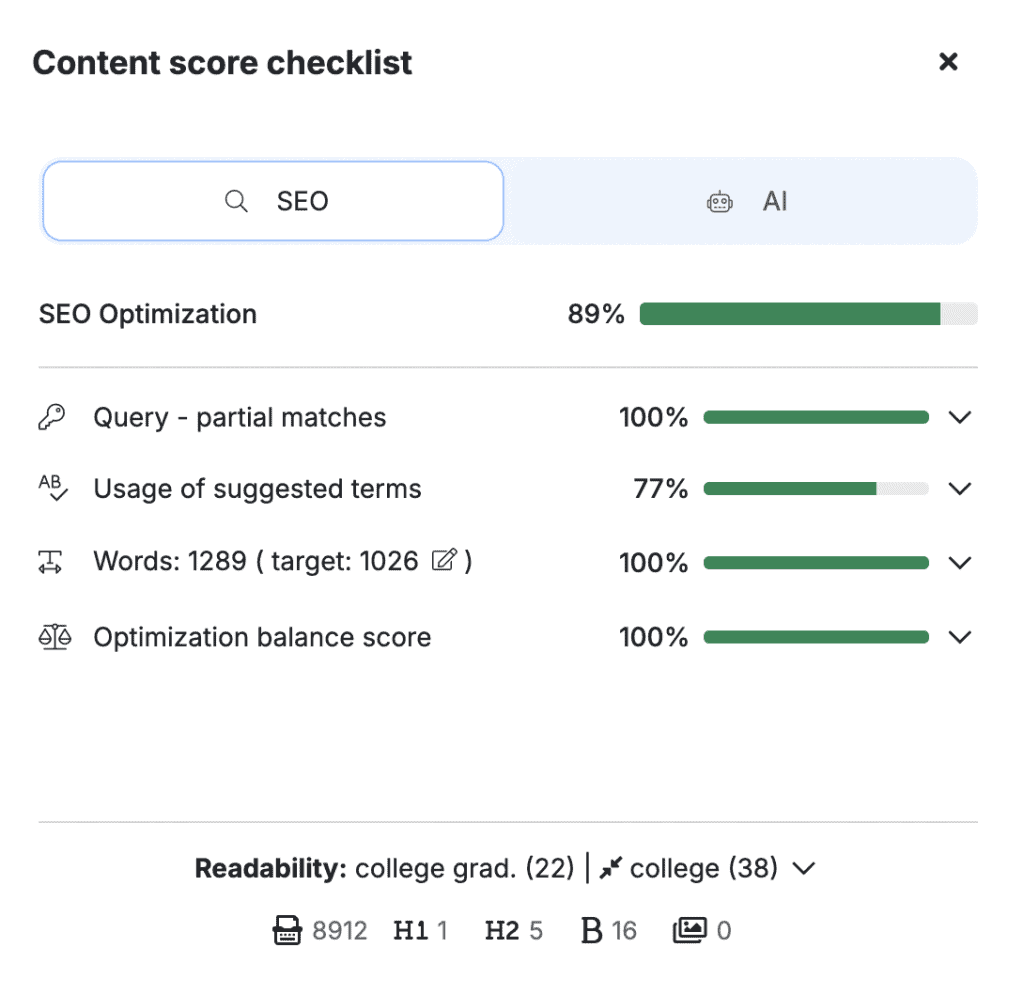
What is AI Score in NEURONwriter and How Does It Change the Rules of the Game?
AI Score is an advanced metric in NEURONwriter, designed specifically to evaluate and optimize content for artificial intelligence and large language models (LLM).
It’s more than a classic SEO indicator. While traditional Content Score (SEO Score) focuses on semantic optimization and keyword usage in relation to SERP analysis, AI Score goes a step further, analyzing content in three fundamental dimensions: Topic Coverage, Structure, and Clarity.
How Does AI Score Differ from SEO Score?
SEO Score is your guide to what to say (which words to use) so that Google understands the topic of your article. AI Score, on the other hand, is your mentor who suggests how to say it so that your content is not only understandable, but also useful for advanced AI systems.
| Feature | SEO Score (Content Score) | AI Score |
| Main goal | Optimization for traditional search engine algorithms (keywords, semantics). | Optimization for large language models (LLM) and conversational search. |
| Key metrics | Use of semantic terms, optimization of headings and meta tags for phrases. | Topic Coverage, Structure, Clarity. |
| Answers the question | Are you using the right keywords to compete in SERP? | Is your content logical, clear, and comprehensive for AI? |
| Benefit | Higher positions in traditional search results. | Better visibility in AI-generated results, greater chance of being a source for chatbots. |
Both indicators are complementary. Achieving a high score in both is a signal that your content is comprehensively prepared for the challenges of the modern and future internet.
How to Use the AI Score Feature? Step-by-Step Instructions
Launching and using AI Score is intuitive and built into the content creation process in NEURONwriter. Here’s how to do it.
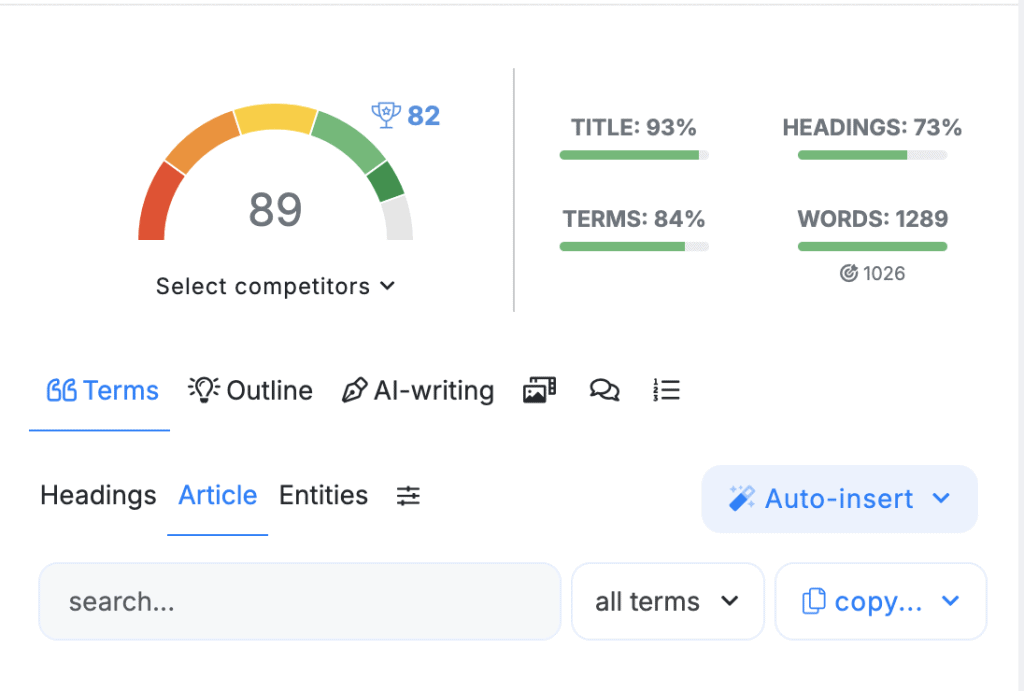
Where to Find AI Score?
1.Open the content editor in NEURONwriter for the selected query.
2.In the upper right corner you will see the main Content Score indicator (e.g., number 87 on a colored background).
3.Click on this indicator. A window with a Checklist will open.
4.In this window you will see two tabs: “SEO Score” and “AI Score”.
5.Select the “AI Score” tab. The system will analyze your text in real time and display a score along with recommendations for each of the three pillars.
.
Understanding AI Score Components.
After going to the AI Score tab, you will see a score divided into three key elements. Understanding them is the key to effective optimization.
- Topic Coverage.
This metric evaluates how comprehensively your article addresses a given topic compared to top competitors in search results. NEURONwriter analyzes SERP to identify key subtopics, issues, and questions that users and algorithms expect.
Practical tip: If your Topic Coverage score is low, it means you have probably missed important sections or have not answered relevant questions related to your main keyword. Review the recommendations and supplement the content with missing information.
- Structure
This indicator analyzes the logical organization of your content. It checks whether the text has a sensible flow, whether headings (H1, H2, H3) create a coherent and understandable hierarchy, and whether individual sections naturally connect with each other. Good structure is crucial not only for human readability, but also for AI, which must understand the relationships between different parts of the text.
Practical tip: A poor score in this category may indicate a chaotic layout of headings or lack of smooth transitions between paragraphs. Make sure your H2 headings develop the main topic from H1, and H3 headings discuss issues from H2 in detail.
- Clarity
Clarity is an assessment of how easy it is to understand and absorb your content. AI Score analyzes elements such as sentence length, language complexity, paragraph length, and use of formatting (e.g., bullet points, bold). Content that is clear to humans is also easier to process for artificial intelligence.
Practical tip: If you receive a low score for Clarity, NEURONwriter will suggest specific actions, e.g., “Break long paragraphs into smaller ones” or “Transform dense text into a bullet list”. Applying these tips will immediately improve readability.
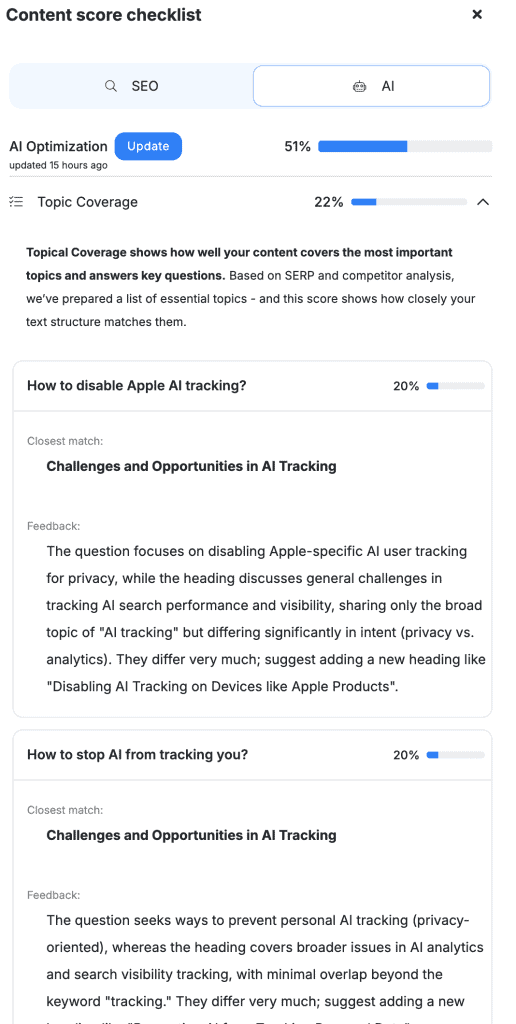
.
Practical Examples of Using AI Score.
Theory is important, but let’s see how AI Score works in everyday work.
Example 1: Writing a New Blog Article from Scratch.
Let’s say you’re writing an article on “How to choose the best hosting for an online store”.
1.Problem: The topic is broad and competitive. You want to create the most comprehensive guide that will be appreciated by Google and AI.
2.Solution (with AI Score):
- After creating the first draft version of the article, you go to the AI Score tab.
- Topic Coverage shows 70%. You analyze the recommendations and see that you missed discussing “SSL certificates” and “automatic backups”. You add dedicated sections on these topics.
- Structure has 65%. It turns out that your headings are not very logical – e.g., the pricing section is before the section on types of hosting.
- Clarity is 60%. The tool points to several very long, over 5-line paragraphs. You divide them into smaller ones and transform the list of hosting features into a readable bullet list.
3.Final effect: After implementing the changes, your AI Score increases to 92%. The article is not only well-optimized for keywords (high SEO Score), but is also logical, comprehensive, and clear. It has a much greater chance of high positions and being used as a source by AI systems.
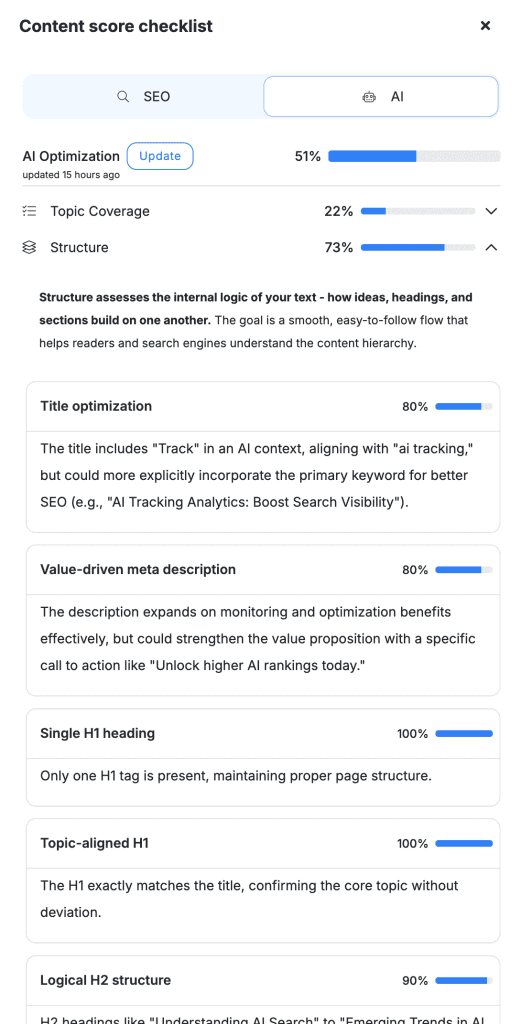
Example 2: Optimizing an Existing Article.
You have an article on your blog about “marketing trends for 2024” that has good positions, but you want to prepare it for the future.
1.Problem: The article is well-written, but was created a year ago and may not be fully compliant with the expectations of modern AI algorithms.
2.Solution (with AI Score):
- You import the article content into NEURONwriter.
- You check AI Score. Topic Coverage is relatively high, but Structure and Clarity require improvement.
- The tool suggests that summaries of key facts and direct comparisons between trends are missing. You add brief summaries after each section and create a table comparing e.g., video marketing with audio marketing.
- You also improve several overly long sentences, simplifying the language.
3.Final effect: AI Score grows, and the article becomes “fresher” and more digestible for both readers and bots. You increase its longevity and ranking potential in the changing search ecosystem.
Benefits You Will Feel in Everyday Work.
Implementing AI Score in your workflow is not just chasing another metric. It’s an investment that brings real benefits:
- Time savings: Instead of guessing what AI algorithms expect, you get specific, practical tips in real time.
- Higher content quality: The tool motivates you to create more thoughtful, logical, and clear texts, which your readers will also appreciate.
- Better SEO results: Content optimized for AI has greater potential to achieve high positions in Google, especially in the context of Search Generative Experience.
- Competitive advantage: You are already preparing your content for the future of search, ahead of the competition, which still focuses only on traditional SEO.
- Greater user engagement: Better structure and clarity translate into lower bounce rates and longer time spent on the page.
Integrations and Usage Context.
The power of NEURONwriter, including the AI Score feature, grows through integrations. You can connect the tool with:
- Google Search Console: To import data on the effectiveness of your content and find new optimization opportunities.
- WordPress and Shopify: To publish optimized content directly on your site or in your store.
AI Score is particularly useful when creating content where depth and structure are crucial, such as:
- Blog articles and guides (so-called cornerstone content).
- Product reviews and comparisons.
- Content-based landing pages.
- Expert articles and knowledge bases.
Summary: Take a Step into the Future of SEO with AI Score
AI Score in NEURONwriter is a powerful tool that redefines content optimization. It ceases to be just a game of keywords, and becomes the art of creating comprehensive, logical, and clear materials, ready for the era of artificial intelligence. Thanks to precise tips regarding topic coverage, structure, and clarity, you can create content that will not only gain high positions in Google, but will also become an authoritative source for language models.
Don’t wait for changes in algorithms to surprise you. Start using AI Score today and gain confidence that your content is prepared for the future. Test the feature on one of your articles and see the difference for yourself! http://neuronwriter.com
